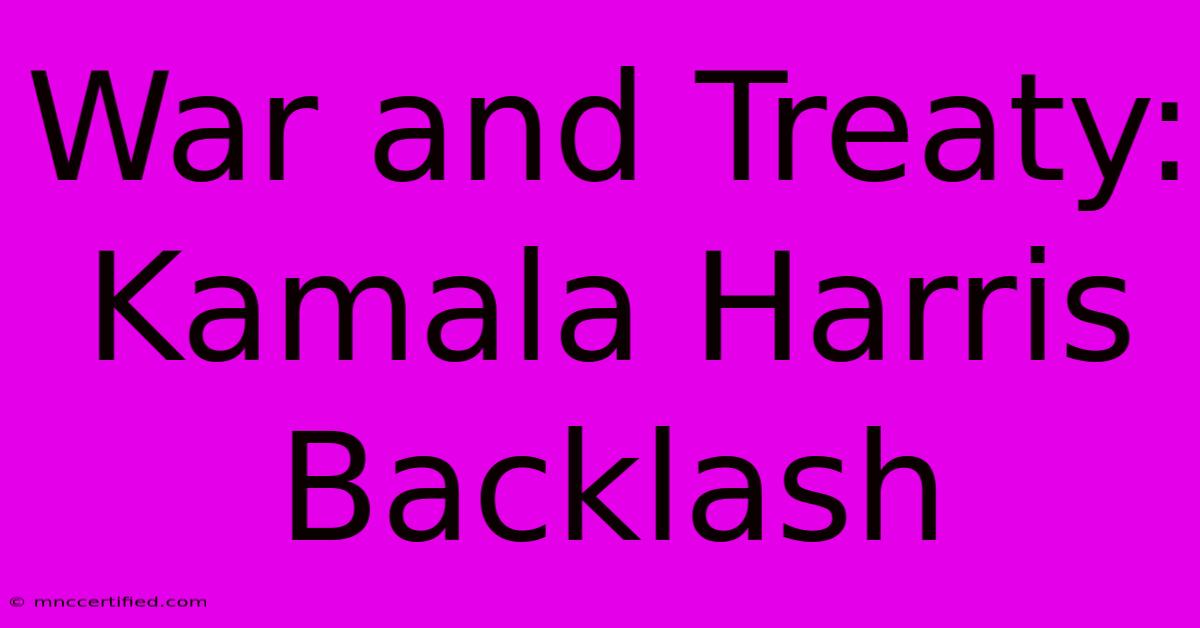War And Treaty: Kamala Harris Backlash

Table of Contents
War and Treaty: The Kamala Harris Backlash and its Implications
Vice President Kamala Harris' recent foreign policy initiatives have sparked considerable debate, leading to a notable backlash both domestically and internationally. Understanding the nuances of this criticism requires examining the context of her actions, the specific points of contention, and their potential long-term consequences. This article delves into the core issues fueling this backlash, analyzing the criticisms and their impact on the Biden administration's foreign policy agenda.
The Roots of the Backlash: A Critical Examination
The criticism surrounding Vice President Harris' foreign policy engagements stems from several key areas:
1. Perceived Inconsistency in Messaging:
One major source of contention is the perceived inconsistency between the Biden administration's stated goals and Harris' actions. While President Biden emphasizes diplomacy and de-escalation, some critics argue that Harris' rhetoric and actions have at times projected a more hawkish stance, leading to confusion and undermining the administration's overall message. This inconsistency, they argue, creates uncertainty among allies and adversaries alike. For instance, [cite specific example of perceived inconsistency]. This lack of clear and consistent messaging is a significant factor contributing to the backlash.
2. Handling of International Relations:
Harris' interactions with foreign leaders have also drawn scrutiny. Critics point to instances where her diplomatic efforts have been perceived as less than successful, potentially damaging relationships crucial to US foreign policy objectives. [Cite specific examples of criticized diplomatic encounters]. This perceived ineffectiveness fuels the narrative of a less-than-adequate approach to international relations, contributing to the ongoing backlash.
3. Domestic Political Fallout:
The backlash against Harris' foreign policy isn't solely confined to international relations. Domestically, critics within her own party and the opposing party question the effectiveness and strategic value of her initiatives. These internal divisions weaken the administration's overall standing and further amplify the negative perception surrounding her foreign policy actions. The debate surrounding [cite specific policy or event] highlights this internal friction.
Analyzing the Criticism: Separating Fact from Fiction
It's crucial to analyze the criticisms leveled against Vice President Harris objectively. While some criticisms may be valid and highlight areas requiring improvement, others may be politically motivated or misrepresent the situation. For instance, claims of [cite a specific unsubstantiated claim] need further investigation and contextualization. A balanced assessment requires evaluating the evidence and acknowledging both successes and failures in her foreign policy engagements.
The Long-Term Implications: Navigating the Challenges
The backlash against Kamala Harris' foreign policy has significant implications for the Biden administration's overall agenda. The erosion of trust among allies and the uncertainty created by inconsistent messaging could hinder the effectiveness of future diplomatic efforts. Furthermore, the domestic political fallout could impact the administration's ability to secure legislative support for crucial foreign policy initiatives.
To mitigate the negative impact of this backlash, the Biden administration needs to:
- Improve communication and coordination: Ensuring consistent messaging between the President and Vice President is crucial to avoid confusion and maintain a unified foreign policy front.
- Prioritize diplomacy and de-escalation: While a strong stance is sometimes necessary, a focus on diplomatic solutions can help build trust and avoid escalating tensions.
- Strengthen internal consensus: Addressing internal divisions within the Democratic party regarding foreign policy will help solidify the administration's position and minimize the impact of domestic criticism.
The ongoing debate surrounding Vice President Harris' foreign policy underlines the complexity of international relations and the challenges of navigating the global political landscape. While constructive criticism is vital for improving effectiveness, a fair and accurate assessment requires separating fact from fiction and understanding the broader context of her actions. The success of the Biden administration's foreign policy agenda hinges on effectively addressing the concerns surrounding the current backlash and implementing strategies to restore trust and confidence both domestically and internationally.

Thank you for visiting our website wich cover about War And Treaty: Kamala Harris Backlash. We hope the information provided has been useful to you. Feel free to contact us if you have any questions or need further assistance. See you next time and dont miss to bookmark.
Featured Posts
-
Life Insurance Attorneys Near Me
Nov 21, 2024
-
Russia Launches Icbm At Ukraine
Nov 21, 2024
-
Insurance Mobile App Development
Nov 21, 2024
-
When Does Vision Insurance Reset
Nov 21, 2024
-
Crypto Tax Calculator Promo Code
Nov 21, 2024